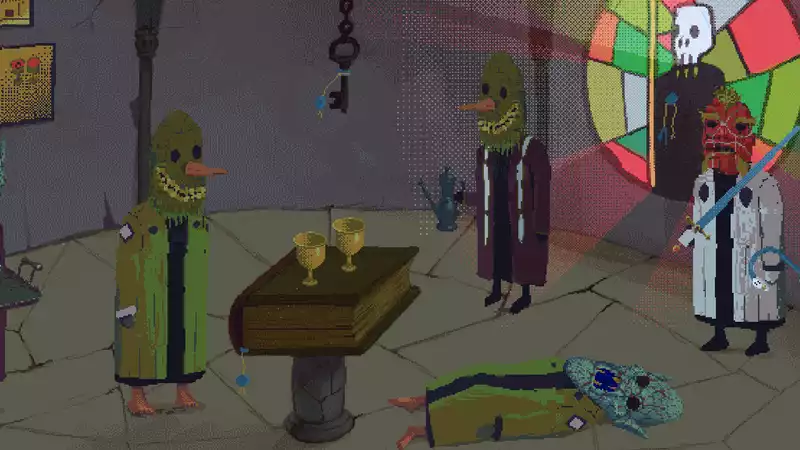A woman lies dead on a couch, her mouth open in shock. Some members of the dinner party she was attending shudder in horror, while others hurl angry accusations at one another. Only one of them is smiling happily. In "The Golden Idol Case," one of the most original and challenging mystery games I have played in years, I have yet another fascinating murder to solve.
I set out to investigate and clicked on everything. They are frozen in time, stopped at the moment of the victim's death, so I freely explore their pockets with my mouse pointer, peering into coins, rings, and monogrammed handkerchiefs. Then I move to the two maids standing in the kitchen downstairs and examine the notes and letters they carry. I find discarded letters in the trash, uneaten food on the table, and most interesting of all, a pouch hanging by a rope outside the window.
Then, over the next hour, I slowly determine the identity of each person, determine which room in the house belongs to them, and match it with their belongings. I also determined where each person was sitting at the dinner table when the murders occurred. We know who was the ringleader and who carried it out and for what purpose. This murder, and likewise the entire game, is a dark and brilliant story told with disparate clues, and piecing it together and unraveling it makes me feel a lot smarter.
"The Golden Idol Case" begins with a simple murder: one man pushes another off a cliff. To investigate, one clicks on clues at the murder scene and then clicks on words in the clues. A diary or note might contain a first name and last name. There may (and usually is) a weapon in the pocket, such as a pistol or blade, or in the fireplace may be a scrap of a suicide note that someone hastily tried to dispose of. As you carefully look around the scene and click on clues, the words sword, stabbed, pushed, button, drop door, etc., appear at the bottom of the screen, along with the names of the characters who found them.
Tapping the space bar switches from exploring the murder scene to "thinking" mode, where you can drag and drop the words you have collected into the blank space to solve the case. The scroll to the left contains a description of the case: e.g., Blank murdered on a blank island. Murder by Mad Libs. All that is required to proceed to the next case is to fill in the murder scroll correctly, one word at a time.
But there is a bonus goal: in the center of the thinking screen is a portrait gallery, where you can match first and last names. After this, on the right side of the screen, there is a slot for entering more detailed information, for example, who was sitting where at the dinner table. Some of the characters will reappear in later murders, so it is well worth filling in everything.
There are a dozen or so cases, but they quickly become elaborate and complex, involving more suspects, more mysterious motives, tons of unrelated clues, and many secrets. Clues come not only from the collected words, but also from the details of the oddly illustrated scenes themselves. It can take a lot of looking around a scene to notice a small, minute detail, such as a tattoo on someone's wrist or initials in a ledger book. Even minimal animation in a scene can help us understand what happened, like the movement of someone's eyes, even if it doesn't provide a clue to click.
My favorite case resembles the setting of a classic mystery novel: a body is found in the parlor of a sprawling mansion, the suspects are odd-looking (including, naturally, the butler), and there is some evidence too convenient to point to a likely killer. A detective is called in to question everyone in the house about their whereabouts at the time of the murder. Nice work, but I'll take it from here, pal.
Paired with the satisfaction that comes from solving a complex crime and moving on to the next, these murders have a long and fascinating narrative that centers on the Golden Idol itself. The idols are not mere trinkets or imitations, but esoteric objects of magic and power, and with each murder I learned more about the enigmatic idols, what they can do, and why so many people feel they are worth committing brutal murder to possess them.
As the years passed, the secrets of the idols were gradually unlocked, their power was used in fascinating ways, and their owners grew in power and prestige. This makes solving these murders not just a series of fantastic crime investigations, but very imaginative storytelling. I don't say this about many games, but The Golden Idol Case would make one hell of a novel.
I had a few cases that never fully came together for me. In one case, I was never able to fully unravel the motive, and even after solving the case, I don't even know how I was going to figure out the motive.
I would also occasionally brute force the names and details of the last few people in a case, trying every possible combination in an empty slot, adventure game style. I also had no interest in the last few cases. Partly because it made me do the math (unforgivable), and partly because most of it felt more like data entry than an elaborate murder investigation.
However, the fact that some of the pieces did not fit perfectly did not stop me from finding the overall story of "The Golden Idol Case" a satisfying conclusion, nor did it stop me from loving this ingenious detective adventure. Nor did it stop me from loving this ingenious detective adventure. I just wish there was a "randomize all" button so I could figure it all out again.
.

Comments